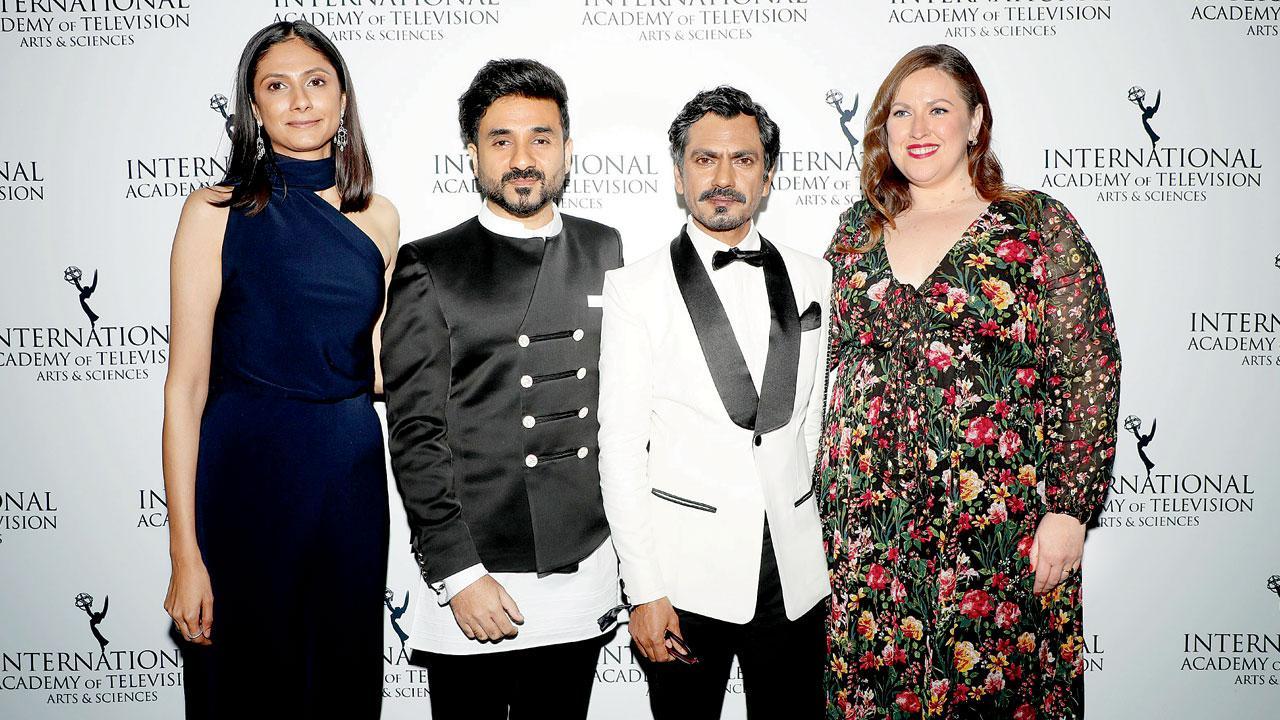Left to me, would give Nobel Peace to Emmys or Netflix for proving the world is one, slowly, one show/film at a time

Vir Das; Nawazuddin Siddiqui; Nathalie Laurent-Marke, director, stand-up comedy, Netflix; and Pratiksha Rao, director, films, Netflix India on the International Emmys red carpet in New York City
 As red carpets for entertainment shows go—not that I’ve been to many—the one at the International Emmy Awards, held annually in November in New York City (NYC), is adorably strange.
As red carpets for entertainment shows go—not that I’ve been to many—the one at the International Emmy Awards, held annually in November in New York City (NYC), is adorably strange.
ADVERTISEMENT
The cameras are, as usual, lined up behind a gold-velvet, low partition. Nominees file in to pose before the logos’ standee, dressed in their designer best. Only that the cameramen don’t know who these celebrities are!
Many of them have a sheet of paper, stuck below the back of the camera, with photographs to match/identify those they’re meant to photograph! And this isn’t some esoteric, art-house global film festival—even, say, Cannes/Berlin, for that matter. Each celebrity walking in is actually world-famous, in their own country!
Only the photogs, representing multiple agencies, are local New Yorkers, with the brief to capture stars from another sky/world, as it were. A lady announces the name of the country the stars filing in are from, with another lady holding a placard with names, in the order that they’re standing! Japanese stars, wearing nominees’ medals around their neck, thrusting their medallions towards the lenses, stand out.
“Smack me in the head, when your guys are in there,” Shai, the Netflix cameraman, tells me for when the nominees from India—Nawazuddin Siddiqui (Best Actor, Serious Men) and Vir Das (Best Comedy, stand-up special, Vir Das: For India), along with their producers—arrive on the red carpet. “Smack you hard, or gently?” I ask Shai. “Just enough that the camera doesn’t shake!”
That the venue for such an award is the Big Apple couldn’t be more apt. NYC is literally the migrant melting pot of global ethnicities/geographies—for mainstream entertainment from across the world to find space/love, in a nook/cranny, home/bar.
I’ve hung out with Nawaz in NYC. He’s been left alone, or mobbed, depending on where we are—parts of neighbouring Jersey City can be Desi Central.
Equally befitting that the Americans host the Emmys. Which are? The Olympics of popular television, quite simply. Only that the International Emmys is more specifically that still. As you hear announcers on the red-carpet go, “Colombia, Germany, Canada, Egypt, Thailand…”
And now, only over the past half a decade, India, by the way. Although the International Emmys have been around since 1973. What’s changed for Indian TV? OTTs like Netflix, Amazon Prime Video obviously—that place content to be simultaneously accessed globally. Making world-class quality as much a possible measure of achievement as local viewership.
As against traditional, desi TV, altogether based on ratings to attract advertising alone. Mid ’90s onwards, once satellite TV came into India, its networks had no reason to match the quality of HBO from the same decade. What’s the point?
Which isn’t to say quick, sasta TV wallah stuff haven’t found Indian OTT shelf-space. They just don’t make it to the International Emmys, like they never did before.
Where the nominees, across categories, are first picked from the best representing each continent. The jury, I’m told, can’t be from the competing countries thereafter. A general rule to qualify, I guess, is that the productions aren’t US-based. Although I think they mean it isn’t Anglo-Saxon mainstream.
The Crown, for instance, is as British as it gets. It won the Best Drama Series Emmy in 2021. Those Emmys are called Primetime, with a stronger American connection, by way of active production/audience still.
The International Emmys is the equivalent of the Best Foreign Film category, introduced at the Oscars in 1956 (27 years after). Imagine that category as a separate Oscars of its own, with further sub-categories—that I strongly believe the Academy Awards must consider, if they haven’t. Because that’s where the world is.
What does such Emmys do to content worldwide? Redefine mainstream, gradually; delinking it from what we deem as local; which has happened with streaming services already. Nobody thinks of Money Heist/Narcos (Spanish) or Dark (German) as “international” shows, meaning non-English, non-American, anyway.
The biggest thing to happen to global TV lately is of course Squid Game in Korean—watched by more people on Netflix, and maybe earth (close to 150 million), than anything else. According to a BBC report, Koreans don’t like Squid Game much.
“The team in Korea that made Squid Game did not anticipate this level of success either,” Pratiksha Rao, director, films, Netflix India, tells me, attributing a “relatable, universal theme in a never-seen-before setting” to its astounding viewership. I just think it was a great follow-up to the Best Picture Oscar for Parasite, which had directed lay audiences to Korean cinema/content, in a way that nothing had.
Somewhat the same way Vir Das tells me he wonders what non-Indians, say Germans, make of Chyawanprash or “Andheria mod ki churail” references in his stand-up special, competing at the International Emmys, against France’s Call My Agent S4, for Best Comedy, no less!
Nawaz and Vir walk on the NYC red carpet. Our cameraman Shai does not need to be smacked in the head to recognise either. Pretty sure he would’ve tuned in to Serious Men in Hindi, with Nawaz in it, that night on Netflix. This is how the world could slowly become one. Yup, awards in these things matter.
Mayank Shekhar attempts to make sense of mass culture. He tweets @mayankw14
Send your feedback to [email protected]
The views expressed in this column are the individual’s and don’t represent those of the paper.
 Subscribe today by clicking the link and stay updated with the latest news!" Click here!
Subscribe today by clicking the link and stay updated with the latest news!" Click here!







